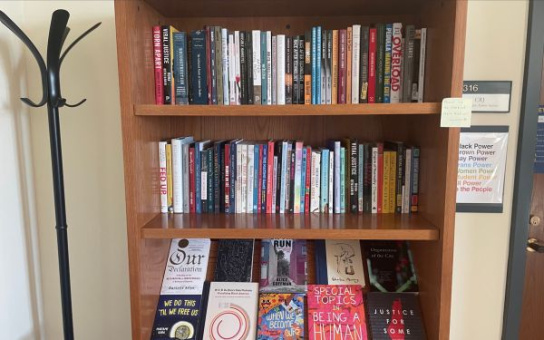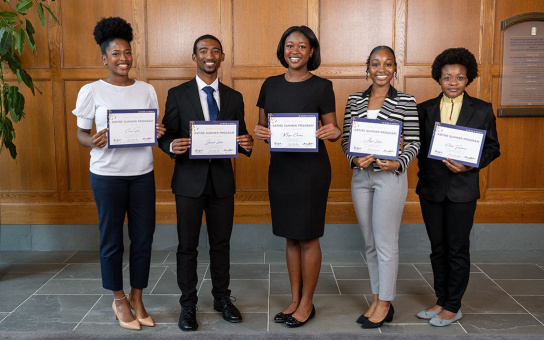DEI current work
What are we working on now?
Updated September 2024
Digital Accessibility: CAPTION Quick Guide
The CAPTION Guide aims to inform Ford School faculty, staff, student organizations, event coordinators, and anyone utilizing digital mediums about accessibility checks for websites, documents, videos, course material, social media, and other digital content. Its primary purpose is to increase inclusivity and accessibility in the digital realm, allowing everyone, including those with disabilities, to fully participate and engage. The guide serves as a checklist and resource to consult before creating or interacting with digital mediums. Click here to view and/or download the CAPTION Checklist and click here to view the comprehensive CAPTION Quick Guide.

Books for Belonging
As part of the Ford School's ongoing efforts to foster a culture of belonging, the DEI Coalition opened a Books for Belonging mini-library in Weill Hall in May 2024. The Ford School Community donated over 60 books to the library and provided dozens of additional book suggestions on key topics of interest (e.g. anti-racism, disability and accessibility, gender and sexuality, mental health and well-being, international/intranational topics, faith/spirituality).
To ensure the success of this initiative, the DEI Coalition invited the Ford School community to:
- Recommend books: tell us about books you've read that have helped you understand others, or told a story that resonated with your experiences,
- Donate books to help build the library, or,
- Both! Suggestions and donations will play a vital role in creating a collection that reflects the diverse perspectives and experiences within our community.
Sharpening our focus
The DEI coalition meets regularly to review the Ford School's planned activities in the DEI 2.0 strategic plan and to identify issues and propose new activities, initiatives, and organizational changes around four areas of focus:
- Disability & Accessibility
- Creation and promotion of a universal design Digital Accessibility Toolkit
- International student success
- Creation of an International Student Guidebook
- Displaying a Fordies Across the World map on the second floor of Weill Hall to celebrate the geographic diversity of our community.
- Gender & sexuality
- Introduction of a Gender, Sexuality in Public Policy course in Winter 2025
- Mental health & wellbeing
- Hosting a community-based intervention training for the 2024-2025 academic year.
Enhancing our curriculum
We support our faculty in their efforts to incorporate an explicit understanding of structural racism and the historical role that policy has played both in building inequality and pursuing equality. This includes the further building of a clearinghouse with a wide variety of faculty resources (i.e., sample course assignments, multimedia material, conceptual models, theories, frameworks, glossary of terminology). Some of the Ford School's new courses in the 2023-24 academic year include:
- Kamissa Camara, the former Foreign Minister of Mali, teaches Great Power Rivalry and the International Order.
- Kristina Fullerton-Rico teaches Latinx Policy Perspectives and Social Movements in the U.S.
- Yousif Hassan joins the Ford School in Winter 2024 and will teach a course on the relationship between race, digital technology, and technoscientific capitalism.
- Mo Torres will teach Race, Place, and Inequality in Winter 2024.

Expanding our outreach
We’re strongly committed to strengthening important initiatives to increase diversity in public policy. Our summer 2024 Applied Social Policy Internship and Research Experience (ASPIRE) program provided hands-on experience to five outstanding Spelman and Morehouse students interested in social science research.
Creating space for discourse and healing
This semester we are supporting CommuniTea, a student-led series of informal, bi-weekly gatherings on key topics of interest. These gatherings offer a space for open dialogue, reflection, and healing among students. The topics will range from local and national policy issues to global concerns, and the discussions will be shaped by our student organization leaders with the support of the DEI team.
Cultivating a diverse community of changemakers

The Ford School's Center for Racial Justice visiting fellows will host a Racial Justice in Practice Workshop in Winter 2025. The visiting fellows program offers racial justice leaders, activists, artists, advocates, and scholars a prestigious, highly competitive fellowship designed to recognize their transformative work to date and provide opportunities to strengthen their impact within the policy landscape.
Dr. Amanda Alexander, the founding Executive Director of the Detroit Justice Center, is a racial justice lawyer and historian who works alongside community-based movements to end mass incarceration and build thriving and inclusive cities. Originally from Michigan, Amanda has worked at the intersection of racial justice and community development in Detroit, New York, and South Africa for more than 15 years.
Charlene Carruthers is a writer, filmmaker, community organizer, and Black Studies PhD Candidate at Northwestern University. A practitioner of telling more complete stories, her work interrogates historical conjunctures of Black freedom-making post-emancipation and decolonial revolution, Black/Native/Indigenous relationalities, Black governance, and Black feminist abolitionist geographies.
Bianca D.M. Wilson, PhD is an Associate Professor in the Department of Social Welfare at the Luskin School of Public Affairs and an affiliate faculty member of the California Center for Population Research at UCLA. Her research explores the relationships between culture, oppression, and health. Dr. Wilson examines LGBTQ economic instabilities and involvement with systems of care and criminalization, with a focus on the ways racialization, sexual orientation, gender identity, and gender expression play a role in creating disproportionality and disparities.
